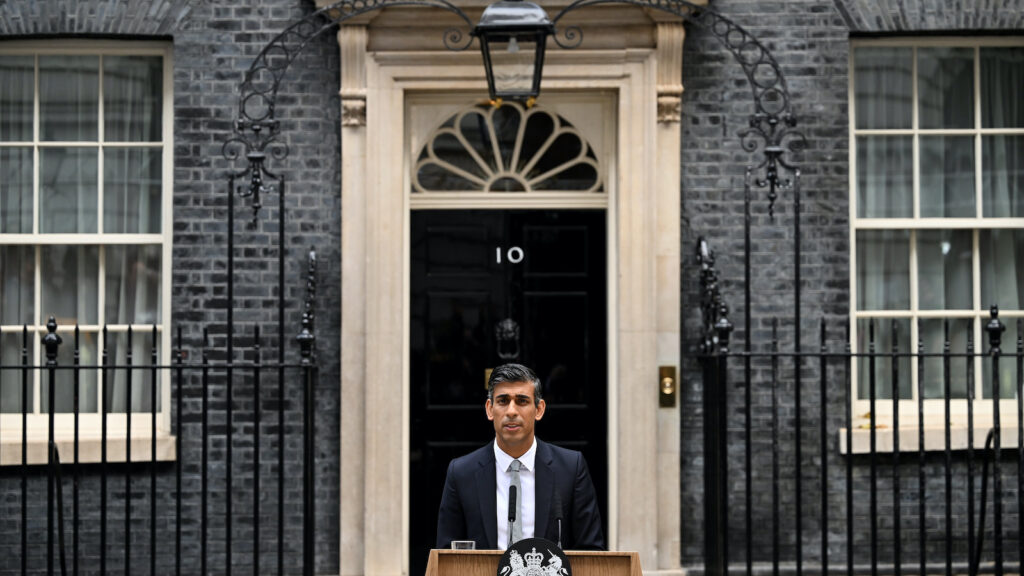Can the New UK Government Press the Reset Button With the EU?

President of France Emmanuel Macron (L) and British Prime Minister Rishi Sunak greet each other during the COP27 climate summit on November 7, 2022 in Sharm El Sheikh, Egypt.
Photo: Stefan Rousseau – Pool/Getty Images
Europeans on the continent have watched the recent political turmoil shaking the U.K. with consternation, but not without a certain sense of inevitability. Both the European Commission as well as member states are convinced that for as long as the U.K. fails to deal with the contradictions of Brexit by starting a more honest, domestic political debate, friction with EU partners will remain.
The most realistic goal in the medium term for the EU is to manage rather than to eliminate it. The overall objective is quite simply to avoid letting things get out of hand. “Working together is the only way to face common challenges,” European Council President Charles Michel recently said, stating the obvious, adding, “bringing stability is key to overcoming them.”
Waiting for the British to Make the First Move
With Prime Minister Rishi Sunak now in charge at number 10 Downing Street, European partners have assumed a wait-and-see approach. It will be for the British side to make a first move and signal to Brussels how it intends to shape the relationship. So far, there has not been much. The choice to appoint Sunak as prime minister has not triggered a fundamental debate about Brexit within the conservative party.
Attempts to open a discussion about the possibility of a future relationship with the EU, inspired by the arrangement Switzerland has with Brussels, immediately hit the wall of hardcore Brexiteers. What is left is the timid change in tone introduced by Liz Truss’ government, notably the admission mistakes were made when dealing with EU institutions, coupled with a vague promise to take a more humble, pragmatic approach towards partners across the channel.
Sunak reached out to France on migration and to the Irish government and EU institutions on the Northern Ireland Protocol. But he will have to tread carefully, until the more fundamental internal rift among conservatives about Europe, or indeed about the larger question of Britain’s place in the world, is resolved.
Europeans certainly hope Prime Minister Sunak’s pragmatic approach on dealing with the budget and the economic challenges the U.K. is facing can also translate into a toned-down approach toward Europe. It is self-evident that removing the vitriolic anti-EU rhetoric of previous governments, especially former Prime Minister Boris Johnson’s, from the relationship, makes future compromises more easily achievable.
A Softer Tone Is No Guarantee of a Better Relationship
However, a softer tone is no guarantee for a different, more constructive relationship. In fact, at least publicly, Prime Minister Sunak is still pressing ahead with the controversial legislative proposal to override parts of the Northern Ireland Protocol (NIP), a move that could potentially not only poison the relationship with Brussels, but also with the U.S. administration in Washington, D.C.
The Northern Ireland Protocol has become the main hurdle toward a more mature post-Brexit partnership with the EU. It grants a special status to Northern Ireland to ease the relationship with the rest of the island, and it does so by leaving it in the EU’s common market. Consequently, some trade checks need to be enforced between Northern Ireland and the rest of the U.K., which of course, is no longer part of the common market. Critics of the protocol say this creates a de facto border between Northern Ireland and the rest of the U.K. and is, therefore, unacceptable.
To the former banker Sunak, it should also have become clear that markets — and the Bank of England — have largely lost confidence in the U.K. government’s ability to make Brexit a success.
With the U.K. government’s autumn fiscal statement out of the way, Prime Minister Sunak will have more time to engage on the thorny issues related to Brexit, including the NIP or the future role of the European Court of Justice in enforcing mutual arrangements. The U.K. government seems determined in trying to avoid anything that could be seen by markets as a new reason to sell off gilts (government bonds) and by doing so causing financial conditions for households and corporates to tighten even further.
To the former banker Sunak, it should also have become clear that markets — and the Bank of England — have largely lost confidence in the U.K. government’s ability to make Brexit a success. For as long as economic headwinds continue to blow in its face, Prime Minister Sunak will continue to be primarily engaged in damage control, rather than on drawing up grandiose, and potentially disruptive, new pro-growth agendas. Any unnecessary stress with Brussels would be counterproductive.
Prime Minister Sunak Moving Cautiously
This also applies to the promise to shred EU legislation that is still on the U.K.’s statute book. According to media reports, the U.K. government is reconsidering whether it should press ahead with a 2023 sunset clause for EU regulation, which would see all remaining EU rules reformed or revoked by the end of that year. According to those reports, officials now concede the effort would tie up resources that are currently best used elsewhere.
This all suggests that Prime Minister Sunak is willing to take time before engaging on any of the most important open files he has with Brussels. This should give him a better chance to try to align positions internally, an extremely difficult task, but also to carefully explore with the EU how far it is willing to move on the NIP.
While doing so, Prime Minister Sunak’s cabinet should resist the temptation to engage with European capitals bilaterally in the hope of softening the EU commission’s position. This tactic never worked in recent years. Yet, successive U.K. governments believed that talking to and convincing Berlin meant softening Brussels. Instead, it is rather the Commission that now appears to be more willing to listen to its U.K. counterparts.
In EU capitals, Brexit-related issues are dwarfed by bigger challenges, such as the war in Ukraine, the energy crisis and the dark clouds gathering at their own economic horizon. Importantly, the financial turmoil that hit the U.K. provided a cautionary tale to the continent. The lesson is that when uncertainty about the economic outlook is high, no European country is immune to a sudden loss of market confidence, especially if avoidable policy mistakes are made.






